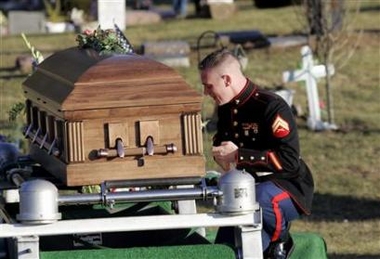US death toll nears 3,000 in Iraq
(Reuters)Updated: 2006-12-23 09:35
BAGHDAD - The US military on Friday reported the deaths of five more soldiers in Iraq as Defense Secretary Robert Gates ended a visit aimed at finding a new strategy to curb violence and allow US troops to withdraw.
A fifth was killed and another wounded west of Baghdad on Friday when their patrol came under machinegun and mortar fire, the US military said. At least 71 US soldiers have died so far this month.
The deaths brought the US toll in Iraq to 2,960, creeping closer to the 3,000 mark and adding more pressure on President Bush to find a strategy that will allow the eventual withdrawal of 135,000 US troops.
While spending the upcoming holiday week at Camp David and his Texas ranch, Bush will hold high-level meetings on Iraq as he gets ready to unveil a fresh strategy in the new year, White House spokeswoman Dana Perino said on Friday.
Bush, who among other ideas is mulling a short-term boost in US troops in Iraq, will be briefed by Gates on Saturday.
Bush has said he will announce a new strategy in January after listening to the advice of his military commanders, State Department officials, Iraqi leaders and Gates.
Gates would not say whether he will recommend a short-term troop surge. Military commanders have raised doubts about increasing troop strength, saying it will only delay a handover to Iraqis.
Gates said whatever strategy was decided, the Shi'ite-led Iraqi government must take the lead in curbing sectarian violence between minority Sunnis and majority Shi'ites that has killed thousands of Iraqis, many in the Iraqi capital.
"The situation in Baghdad is obviously difficult. Clearly success will only be achieved by a joint effort with Iraqis taking the lead," he said at the end of his two-day visit.
"They do have some concrete plans in mind, and putting flesh on those bones is exactly what General Casey and his team and the Iraqis will be doing in the days ahead," he said, referring to the U.S. commander in Iraq, General George Casey.
But critics of Prime Minister Nuri al-Maliki say he has done little to rein in the militias, which are tied to parties within his ruling Shi'ite Alliance and operate with impunity.
Maliki is weakened by infighting in his fractious government between different factions and a boycott by supporters of radical Shi'ite cleric Moqtada al Sadr. The Sadrists, key backers of Maliki, want a timetable for US troop withdrawal.
The leader of an al Qaeda-backed group offered US forces a safe withdrawal from Iraq within a month if they left their heavy weapons behind, according to an audio tape posted on the Internet on Friday.
| 1 | 2 |  |
|
||
|
||
|
|

